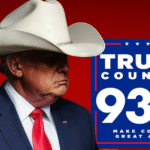Trump Calls for Unified NATO Sanctions Against Russia and Tariffs on China
In a recent statement, former U.S. President Donald Trump emphasized the need for a coordinated response from NATO countries regarding sanctions on Russia. Speaking on September 11, 2025, Trump expressed his readiness to impose significant sanctions on Russia, contingent upon similar actions from all NATO member states. This call to action comes amid ongoing tensions stemming from Russia’s invasion of Ukraine, which has prompted a reevaluation of international alliances and economic strategies.
A Unified Front Against Russia
Trump’s remarks highlight a growing frustration with the current state of NATO’s commitment to countering Russian aggression. In a post on Truth Social, he stated, “I am ready to do major sanctions on Russia once all NATO countries have started to do the same thing.” This statement underscores the importance of a unified approach in dealing with international threats, particularly in light of the ongoing conflict in Ukraine.
Historically, NATO has been a cornerstone of Western defense strategy since its formation in 1949. The alliance was established to provide collective security against the Soviet Union, and its relevance has been reaffirmed in the face of modern challenges, including cyber warfare and territorial disputes. Trump’s insistence on a collective response reflects a broader understanding that isolated actions may not yield the desired results.
Economic Measures: Tariffs on China
In addition to sanctions on Russia, Trump urged NATO allies to impose substantial tariffs on China, suggesting rates between 50% and 100%. He argued that such tariffs would weaken China’s influence over Russia, stating, “China has a strong control, and even grip, over Russia, and these powerful tariffs will break that grip.” This perspective aligns with a growing sentiment among U.S. policymakers that China’s economic ties with Russia pose a significant geopolitical risk.
The relationship between China and Russia has evolved over the years, particularly following the West’s imposition of sanctions on Russia after its annexation of Crimea in 2014. As both nations face increasing scrutiny from the West, their partnership has deepened, raising concerns about a potential axis that could challenge U.S. interests globally.
The Reluctance to Act
Despite his strong rhetoric, Trump has been cautious about implementing sanctions against Russia. Earlier this month, he indicated a willingness to move toward a second phase of sanctions but has yet to take concrete steps. Analysts suggest that this hesitance may stem from a desire to broker a peace deal between Ukraine and Russia, a complex endeavor given the entrenched positions of both sides.
Chris Weafer, CEO of Moscow-based Macro-Advisory, noted that a decisive Russian defeat could push the country closer to China, potentially strengthening Beijing’s global position. This perspective highlights the delicate balance that U.S. and NATO leaders must navigate as they consider their next moves.
Criticism of NATO’s Commitment
Trump’s recent statements also reflect a broader critique of NATO’s commitment to collective defense. He pointed out that some member states continue to purchase Russian oil, undermining the alliance’s negotiating power. “NATO’s commitment to WIN has been far less than 100%, and the purchase of Russian oil, by some, has been shocking!” he remarked. This criticism is particularly directed at countries like Hungary and Slovakia, which have maintained their energy ties with Russia despite the ongoing conflict.
The reliance on Russian fossil fuels has been a contentious issue within the EU, with some member states advocating for a swift transition to alternative energy sources. U.S. Secretary of Energy Chris Wright echoed this sentiment, stating, “We want to displace all Russian gas. President Trump, America, and all the nations of the EU, we want to end the Russian-Ukraine war.”
The Broader Implications
The implications of Trump’s call for sanctions and tariffs extend beyond immediate economic concerns. They touch on the fundamental dynamics of international relations in the 21st century. As nations grapple with the realities of globalization, the interconnectedness of economies means that actions taken in one part of the world can have ripple effects elsewhere.
The potential for a strengthened China-Russia alliance poses a significant challenge to U.S. interests, particularly in the Asia-Pacific region. As both nations seek to expand their influence, the U.S. and its allies must consider how best to respond to this evolving geopolitical landscape.
Conclusion
Donald Trump’s recent statements regarding sanctions on Russia and tariffs on China reflect a critical moment in international relations. As NATO grapples with its commitment to collective defense, the need for a unified response to Russian aggression has never been more pressing. The interplay between economic measures and geopolitical strategy will shape the future of global alliances and the balance of power in the years to come. As the situation continues to evolve, the actions taken by NATO and its member states will be closely scrutinized, with far-reaching implications for international stability.











